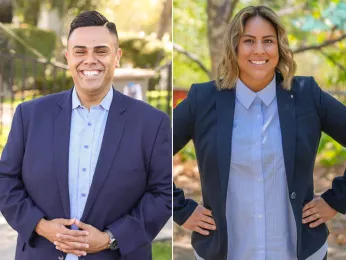
Jun 6
Additional CA LGBTQ bills move on
Matthew S. Bajko READ TIME: 5 MIN.
A bill addressing LGBTQ teen suicide prevention that Governor Gavin Newsom has pledged to sign into law was among the final batch of LGBTQ-focused legislation moving on this Legislative session. Bills addressing access to HIV prevention medicines and the legal process to change one’s name and gender also survived their latest legislative hurdles.
State legislators had to meet a June 6 deadline to pass bills out of their chamber of origin in the Legislature. Of the 20 bills of importance to the LGBTQ community that the Bay Area Reporter has been tracking this year, 18 are advancing and will be taken up for final passage by the Assembly or Senate later this summer.
They have until September 12 to send bills to the governor to either sign into law or veto. Newsom, a Democrat who has a track record of vetoing bills that come with a large price tag, announced last month that he will enact Assembly Bill 727 requiring the Trevor Project’s 24 hours per day, 7 days per week suicide hotline to be included on student identification cards. An analysis of the legislation found it would have “minor one-time” costs in the tens of thousands of dollars allocated from the state’s general fund for public schools, community colleges and the University of California and California State University campuses to implement.
Authored by gay Assemblymember Mark González (D-Los Angeles) to address inflated rates of suicidal ideation in LGBTQ youth, schools in the state serving students in grades 7 to 12, as well as public colleges and universities, would need to update their ID cards for pupils by July 1, 2026, should AB 727 become law. As the bill specifies, the telephone number used by the national LGBTQ youth-focused nonprofit is 1-866-488-7386, while the text line can be accessed by texting START to 678-678.
The bill passed out of the Assembly on June 3 by a 59-13 vote. It now heads to committee hearings in the state Senate in the coming weeks.
Gay Assemblymember Chris Ward (D-San Diego), chair of the Legislative LGBTQ Caucus, noted in voting for AB 727 that “too many queer and transgender youth feel unsafe or unseen at school. This bill ensures crisis support like The Trevor Project is just a call or text away, right on their student ID. This change will save lives and affirm that they matter.”
Also moving on is González’s AB 554 dubbed the PrEPARE Act of 2025, the acronym standing for the Protecting Rights, Expanding Prevention, and Advancing Reimbursement for Equity. It would prevent health care plans and insurance companies from requiring prior authorization or step therapy for all antiretroviral drugs, including injectable medications, used for HIV/AIDS prevention. It also would require such drugs to be covered without cost sharing or utilization review for individuals with private insurance, seen as helping clinics and community-based providers who particularly serve people of color to receive full reimbursement for injectable PrEP medications from private insurance plans.
Medi-Cal managed care plans would be exempted from the provisions, while individual and small group health care service plan contracts or health insurance policies would have until January 1, 2027, to implement them. It passed out of the Assembly on June 3 by a 68-1 vote.
“Safeguards patient and provider choice – ensuring flexibility in selecting the most suitable PrEP medication, while also allowing small, local clinics to receive timely reimbursement for these drugs,” noted González in an Instagram post about his legislative package moving on.
Under AB 1084 introduced by gay Assemblymember Rick Chavez Zbur (D-Hollywood), the legal process to change one’s name to conform with their gender identity would be made easier for both adults and minors. It would also speed up the process for issuing new identification documents or records like a marriage or birth certificate to those updating their sex and gender identifier.
No longer could someone file an objection to an adult petitioner’s change of name to conform to their gender identity and courts would have to enter an order granting the petition without a hearing within six weeks of the petition’s filing. The California Department of Public Health would also need to issue an amended birth certificate within six weeks if it includes a request to change gender under AB 1084.
It passed out of the Assembly June 4 on a 60-13 vote. Should it become law later this year then it would immediately take effect.
“Transgender and nonbinary people across the country are facing relentless attacks that are part of a coordinated effort to both make it more difficult for them to live safely and openly as their authentic selves and to erase transgender people from public life entirely,” Zbur has argued in support of the bill. “AB 1084 will help to ensure that transgender and nonbinary people do not experience unnecessary delays in obtaining accurate identification documents in California so that they can better protect themselves from growing legal threats to their safety and wellbeing and reduce their vulnerability to discrimination and harassment.”
Condoms in schools bill paused
Lesbian state Senator Caroline Menjivar (D-San Fernando Valley) continues to face hurdles in expanding youth access to condoms. The past two years Newsom vetoed bills she carried aiming to do so due to their high price tag, even after state lawmakers last year had allocated $5 million in funding over three years for providing free condoms to ninth through 12th graders in California public schools.
Menjivar came back this legislative session with a tweaked approach to the issue. Among the provisions of her Senate Bill 608 is a ban on public schools serving grades 7-12 from prohibiting school-based health centers from making internal and external condoms available and easily accessible to pupils at school-based health center sites. It would also restrict public school officials from prohibiting condom distribution in the context of educational and public health program initiatives, such as sex education, classes by community partners, peer health programs, campus health fairs, or distributed by school-based health staff.
Her bill would also grant authority to the California Department of Education for monitoring schools’ compliance with the California Healthy Youth Act. It took effect in 2016 and required that all comprehensive sexual health and HIV prevention instruction and materials in grades K-12 be inclusive of LGBTQ students.
And SB 608 would also prohibit pharmacies and retailers from requiring customers to present identification for condom or non-prescription contraception purchases. It failed to make it out of the Senate Appropriations Committee last month, so Menjivar turned it into a two-year bill and has until January to see it move out of its house of origin and be taken up by the Assembly.
Also held in its chamber’s suspense file was AB 1186 authored by Assemblymember Darshana Patel, Ph.D., (D-San Diego) that aims to create the position of Chief Statistician of California within the Department of Finance’s Demographic Research Unit. While the bill was amended to delete reference to the state law requiring the collection of sexual orientation and gender identity data, one of the duties for the person would be to standardize collection of demographic data across state agencies, including all state administrative and survey data.







